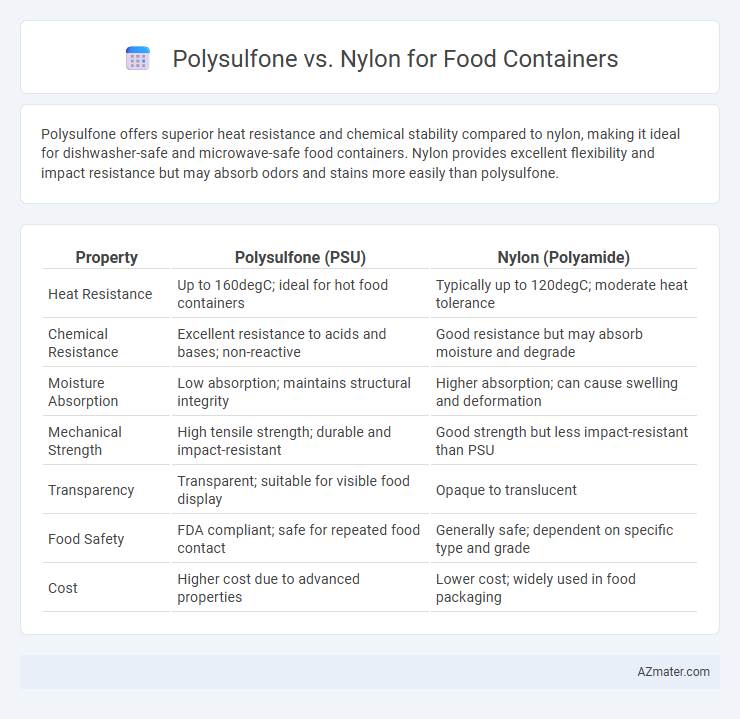Polysulfone offers superior heat resistance and chemical stability compared to nylon, making it ideal for dishwasher-safe and microwave-safe food containers. Nylon provides excellent flexibility and impact resistance but may absorb odors and stains more easily than polysulfone.
Table of Comparison
| Property | Polysulfone (PSU) | Nylon (Polyamide) |
|---|---|---|
| Heat Resistance | Up to 160degC; ideal for hot food containers | Typically up to 120degC; moderate heat tolerance |
| Chemical Resistance | Excellent resistance to acids and bases; non-reactive | Good resistance but may absorb moisture and degrade |
| Moisture Absorption | Low absorption; maintains structural integrity | Higher absorption; can cause swelling and deformation |
| Mechanical Strength | High tensile strength; durable and impact-resistant | Good strength but less impact-resistant than PSU |
| Transparency | Transparent; suitable for visible food display | Opaque to translucent |
| Food Safety | FDA compliant; safe for repeated food contact | Generally safe; dependent on specific type and grade |
| Cost | Higher cost due to advanced properties | Lower cost; widely used in food packaging |
Introduction to Polysulfone and Nylon
Polysulfone is a high-performance thermoplastic known for its exceptional heat resistance, chemical stability, and durability, making it ideal for food containers that require repeated sterilization. Nylon, a synthetic polymer, offers excellent toughness, impact resistance, and flexibility, often used for food storage due to its resilience and lightweight nature. Both materials provide food-safe properties, but their varying thermal and mechanical characteristics influence their suitability for different types of food container applications.
Material Composition and Properties
Polysulfone, a high-performance thermoplastic polymer, offers excellent chemical resistance, high thermal stability up to 180degC, and superior toughness, making it ideal for durable, heat-resistant food containers. Nylon, a polyamide, provides strong mechanical strength and impact resistance with moderate thermal resistance around 120degC, but it is more susceptible to moisture absorption, which can affect its dimensional stability in food storage applications. Both materials are FDA-approved for food contact, but polysulfone's non-porous structure and resistance to hydrolysis provide enhanced hygiene and longevity compared to nylon.
Food Safety and Regulatory Approvals
Polysulfone offers superior food safety due to its high heat resistance, BPA-free composition, and compliance with FDA and EFSA regulations, ensuring no harmful chemical leaching into food. Nylon containers may pose concerns as certain grades can leach amines or phthalates, requiring strict certification to meet food contact standards. Regulatory approvals favor polysulfone for repeated use and high-temperature applications, making it a more reliable material for food storage safety.
Temperature Resistance Comparison
Polysulfone offers superior temperature resistance compared to nylon, maintaining stability and strength at continuous use temperatures up to 150degC, making it ideal for hot food storage and sterilization processes. Nylon typically withstands temperatures up to 120degC but may degrade or lose mechanical properties faster when exposed to prolonged heat. This thermal resilience makes polysulfone a preferred choice for food containers requiring frequent exposure to boiling water or dishwasher cycles.
Chemical Resistance in Food Storage
Polysulfone exhibits superior chemical resistance compared to nylon, making it ideal for food containers exposed to acidic or alkaline substances. Its high tolerance to solvents and stable performance at elevated temperatures ensure no chemical leaching into food during storage. Nylon, while durable, can absorb moisture and degrade when in contact with strong acids or bases, compromising food safety and container longevity.
Durability and Longevity
Polysulfone exhibits superior durability and longevity compared to nylon, making it an ideal choice for food containers subjected to high temperatures and repeated sterilization. Its excellent resistance to chemical degradation, thermal stability up to 160degC, and toughness ensure long-lasting performance without warping or cracking. Nylon, while durable, is more prone to moisture absorption which can lead to dimensional changes and reduced lifespan under rigorous use conditions.
Ease of Cleaning and Maintenance
Polysulfone offers superior ease of cleaning and maintenance for food containers due to its high resistance to heat and chemical degradation, enabling frequent sterilization without material breakdown. Nylon, while durable, tends to absorb moisture and food particles, which can lead to staining and odor retention over time, complicating cleaning efforts. The non-porous surface of polysulfone prevents microbial growth, making it a more hygienic choice compared to nylon's more porous structure.
Cost and Availability
Polysulfone offers high heat resistance and durability, making it suitable for food containers but tends to be more expensive and less widely available than nylon. Nylon is generally more cost-effective and easier to source, though it may have lower heat tolerance and chemical resistance compared to polysulfone. The choice between these materials depends on budget constraints and the specific performance requirements for food storage.
Environmental Impact and Recycling
Polysulfone offers excellent chemical resistance and durability for food containers but faces challenges in recycling due to limited infrastructure and higher energy requirements. Nylon, derived from petroleum, has a significant carbon footprint and can release harmful substances during degradation, though it is more widely recycled through established programs. Choosing between polysulfone and nylon for food containers involves balancing environmental impact with recyclability and lifecycle emissions data.
Choosing the Right Material for Food Containers
Polysulfone offers exceptional heat resistance, dimensional stability, and chemical resistance, making it ideal for repeated sterilization and safe food storage. Nylon provides excellent impact resistance and flexibility but can absorb moisture, potentially affecting food quality over time. Selecting the right material requires balancing thermal durability and moisture resistance to ensure food safety and container longevity.

Infographic: Polysulfone vs Nylon for Food Container
 azmater.com
azmater.com